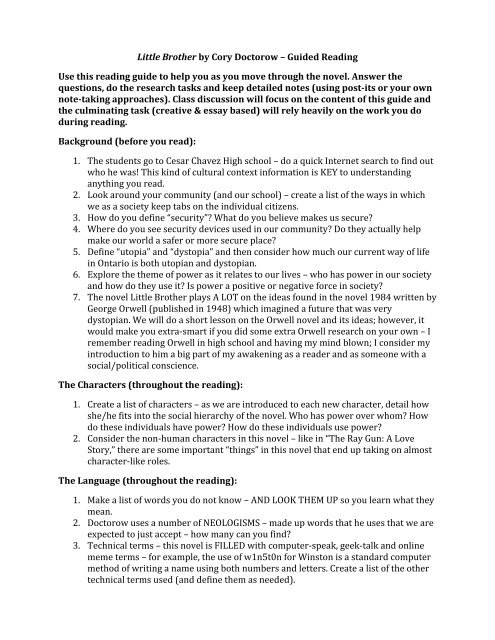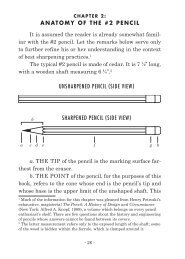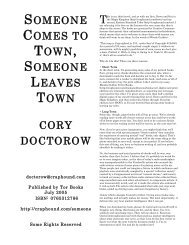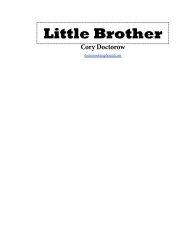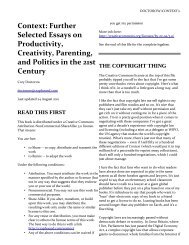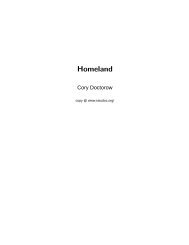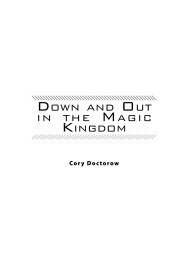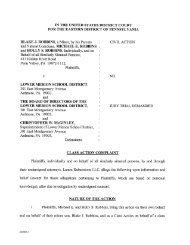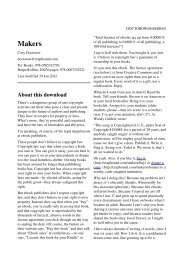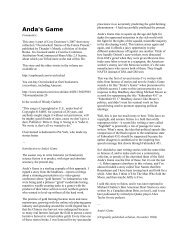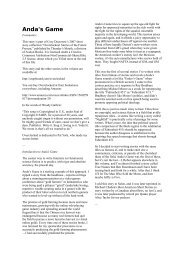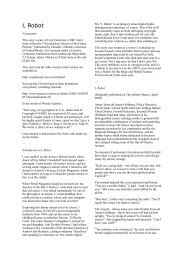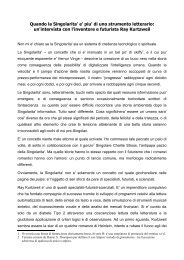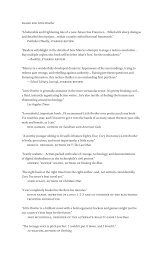Chapter Questions - Cory Doctorow
Chapter Questions - Cory Doctorow
Chapter Questions - Cory Doctorow
You also want an ePaper? Increase the reach of your titles
YUMPU automatically turns print PDFs into web optimized ePapers that Google loves.
Little Brother by <strong>Cory</strong> <strong>Doctorow</strong> – Guided Reading<br />
Use this reading guide to help you as you move through the novel. Answer the<br />
questions, do the research tasks and keep detailed notes (using post-its or your own<br />
note-taking approaches). Class discussion will focus on the content of this guide and<br />
the culminating task (creative & essay based) will rely heavily on the work you do<br />
during reading.<br />
Background (before you read):<br />
1. The students go to Cesar Chavez High school – do a quick Internet search to find out<br />
who he was! This kind of cultural context information is KEY to understanding<br />
anything you read.<br />
2. Look around your community (and our school) – create a list of the ways in which<br />
we as a society keep tabs on the individual citizens.<br />
3. How do you define “security”? What do you believe makes us secure?<br />
4. Where do you see security devices used in our community? Do they actually help<br />
make our world a safer or more secure place?<br />
5. Define “utopia” and “dystopia” and then consider how much our current way of life<br />
in Ontario is both utopian and dystopian.<br />
6. Explore the theme of power as it relates to our lives – who has power in our society<br />
and how do they use it? Is power a positive or negative force in society?<br />
7. The novel Little Brother plays A LOT on the ideas found in the novel 1984 written by<br />
George Orwell (published in 1948) which imagined a future that was very<br />
dystopian. We will do a short lesson on the Orwell novel and its ideas; however, it<br />
would make you extra-‐smart if you did some extra Orwell research on your own – I<br />
remember reading Orwell in high school and having my mind blown; I consider my<br />
introduction to him a big part of my awakening as a reader and as someone with a<br />
social/political conscience.<br />
The Characters (throughout the reading):<br />
1. Create a list of characters – as we are introduced to each new character, detail how<br />
she/he fits into the social hierarchy of the novel. Who has power over whom? How<br />
do these individuals have power? How do these individuals use power?<br />
2. Consider the non-‐human characters in this novel – like in “The Ray Gun: A Love<br />
Story,” there are some important “things” in this novel that end up taking on almost<br />
character-‐like roles.<br />
The Language (throughout the reading):<br />
1. Make a list of words you do not know – AND LOOK THEM UP so you learn what they<br />
mean.<br />
2. <strong>Doctorow</strong> uses a number of NEOLOGISMS – made up words that he uses that we are<br />
expected to just accept – how many can you find?<br />
3. Technical terms – this novel is FILLED with computer-‐speak, geek-‐talk and online<br />
meme terms – for example, the use of w1n5t0n for Winston is a standard computer<br />
method of writing a name using both numbers and letters. Create a list of the other<br />
technical terms used (and define them as needed).
<strong>Chapter</strong> 1:<br />
1. <strong>Doctorow</strong> uses a “near future” – a vision of tomorrow that is just around the corner. In<br />
this chapter we are introduced to a number of things that could be reality in a few<br />
years. Identify a few of them and share your thoughts on if they are good advancements<br />
or not. For example, the students are all supplied their own laptops – this is possible …<br />
in fact, in some places it is already a reality; do you think it’s a good idea? What are<br />
some of the pros and cons as described in this chapter of this?<br />
2. Pg. 10 – “Spending Fridays at school was teh suck anyway, and I was glad of the exuuse<br />
to make my escape.” What is the purpose of “teh”? Do a little research here – this is an<br />
Internet meme.<br />
3. Pg. 11 – the description of the VP includes details of his physique and clothing: “and his<br />
college basketball days are far enough behind him that his chest muscles have turned<br />
into saggy man-‐boobs that were painfully obvious through his freebie dot-‐com polo<br />
shirts.” What is the importance and symbolism behind the VP wearing “freebie dot-‐com<br />
polo shirts”? You will need to look up and understand what the “dot-‐com” bubble was<br />
about and consider how the VP wearing a shirt from one of these companies tells the<br />
reader something about the type of person Mr. Benson is.<br />
4. “Once people figured out that these “free” laptops worked for the man—and showed a<br />
never-‐ending parade of obnoxious ads to boot—they suddenly started to feel very<br />
heavy and burdensome,” (pg. 14). What is the metaphor created in this passage?<br />
Consider the two things that are being actually compared.<br />
5. We are given a description of Harajuku Fun Madness that suggests it has its roots in<br />
Japanese fashion, role-‐playing, drama club and alternate realities. What kinds of games<br />
exist now that are similar, if not necessarily on the same grand scale as HFM?<br />
6. Pg. 19 includes references to Microsoft’s Internet Explorer as well as Firefox; how does<br />
<strong>Doctorow</strong>’s inclusion of these very real companies and products add to the way in<br />
which the audience can relate to the story? IF you don’t know the difference between<br />
Explorer and Firefox, find someone who has an opinion on the two and have a quick<br />
discussion – it’s worth it to understand Marcus and the group of folks this story will be<br />
about (and it’s worth it to figure out which browser may be better for you right now).<br />
7. <strong>Chapter</strong> one includes a number of ways in which Marcus and his friends circumvent a<br />
variety of security systems put in place by the school; list each of the security measures<br />
and provide a short explanation of how they get around them.<br />
8. What are some of the similarities between the way students in the novel get around the<br />
security measures at Cesar Chavez High and the ways students are able to get around<br />
security measures at our school?<br />
<strong>Chapter</strong> 2:<br />
1. What does Marcus wrapping the Physics textbook in paper towels before nuking the<br />
arphid suggest about his character?<br />
2. Social engineering is the art and science of altering behaviour of individuals or of<br />
altering the outcome of a security measure. It is done by altering or convincing the<br />
individual or security measure to do something different than he/she/it originally<br />
intended. For example, sometimes you may socially engineer a situation with me to<br />
convince me to accept an assignment late – this can be done through perhaps pulling a<br />
fire alarm so that I can’t collect the work, or it could be done by convincing me that a
later due-‐date would be advantageous to everyone. There are a number of instances of<br />
Marcus’ skills as a social engineer of both individuals and security to be found in this<br />
chapter; find at least one example of each.<br />
3. This chapter notes that it’s really easy to fake the return number on a caller ID?<br />
<strong>Doctorow</strong> even suggests the reader “google ‘spoof caller id.’” Well … did you google it?<br />
Why would <strong>Doctorow</strong> suggest we do this? How does his call to action pull the reader<br />
into the novel? Connect <strong>Doctorow</strong>’s suggestion to what we know of him as a writer and<br />
an Internet activist – see, this is why knowing some background about him is VITAL.<br />
4. Since the novel is set in near-‐future San Francisco, it would benefit you to actually know<br />
WHERE it is located in the USA and some of the basic information about the city – GO<br />
FORTH AND RESEARCH – come back with at least five interesting facts about the city to<br />
share with the class.<br />
5. Marcus describes the juxtaposition between the touristy side of the city and the<br />
“tenderloin” – quote the description found in this chapter.<br />
6. Consider how the contrast shown between the two areas of town (from q. 5) and what<br />
it says about the way cities WANT to be seen and the truth behind them. What is one<br />
thing about Peterborough that we are told is true but that you feel isn’t the case? Why<br />
would the city rather its vision of the truth be told in both the novel and in our own<br />
town? Who has the right to truth? Who owns the image of our city?<br />
7. Just a note – not a question – as you read through, be aware of how the idea of the future<br />
is filled with Asian influences. This is a common “trope” or concept in much writing<br />
about the future.<br />
<strong>Chapter</strong> 3:<br />
1. Page 36 includes the description of the “middle-‐aged lady in a hippie dress” who is<br />
trampled to death in the crowd rushing from the attack. Consider for a second how she<br />
is a symbol of more than just a single woman being trampled; she is wearing a HIPPIE<br />
DRESS … what does this represent and what could the author also be suggesting is<br />
being trampled in addition to the woman?<br />
2. What does Marcus’ response to the woman’s tragic situation show the reader about<br />
him? Think carefully … he actually has two different responses.<br />
3. Marcus thinks to himself: “I’d never really believed in terrorists before—I mean, I knew<br />
that in the abstract there were terrorists somewhere in the world, but they didn’t really<br />
represent any risk to me” (p. 41). He later muses: “I didn’t know what a terrorist looked<br />
like, though TV shows had done their best to convince me that they were brown Arabs<br />
with big beards and kint caps and loose cotton dresses that hung down to their ankles”<br />
(p. 43). These statements leads to the questions: a) What makes us safe? Who has<br />
power? What is safety? – Consider these … we will discuss them.<br />
4. P. 47 includes a fantastic juxtaposition between terror/torture and mundane normalcy<br />
– find it!<br />
5. Marcus says to his captors, “I’ve got the right to my privacy” (p. 49). He may think he<br />
does, and we may think we do … now look up Bill C30 and see how our own<br />
government is working to control privacy. Do the research and make up your own mind<br />
about who has the right to privacy.
<strong>Chapter</strong> 4:<br />
1. P. 53 references Benneton – it’s a company … check out their ads and figure out what<br />
Marcus is getting at in his reference.<br />
2. Marcus laments to himself, “God help me, I submitted to her will” (p. 56) after giving up<br />
his password to “severe hair cut woman.” There is something interesting in this passage<br />
that shows the reader just how dearly Marcus holds the security of his password … any<br />
ideas what?<br />
3. On the same page, Marcus notes that he never deletes any of his messages – do you?<br />
Why? Has this novel made you rethink this strategy?<br />
4. “There’s something really liberating about having some corner of your life that’s yours,<br />
that no one gets to see except you,” notes Marcus, and then, “It’s not about doing<br />
something shameful. It’s about doing something private. It’s about your life belonging to<br />
you” (p. 57). Comment on these thoughts … agree … disagree?<br />
5. In this chapter Marcus describes both physical and emotional torture. He comments<br />
that he felt “dirty and ashamed” (p. 60). What do you think it is that finally breaks<br />
Marcus and makes him feel this way?<br />
6. The Starbucks take-‐out cup is again seen in this chapter. What does it symbolize for<br />
Marcus?<br />
<strong>Chapter</strong> 5:<br />
1. Consider how the last paragraph on p. 69 acts as an example of how the small pleasures<br />
in life and the little things we take for granted can be so powerful. What kinds of things<br />
in the description of the meal demonstrate to the reader about the experience Marcus<br />
and his friends have just had?<br />
2. P. 70: “In the telling, it receded into the distance.” What receded? And why is the telling<br />
of this thing so important to Marcus?<br />
3. On p. 71 Marcus laments that his punishment “had been sheer vindictiveness. My mind<br />
reeled at the thought. They had done all that as a mere punishment for defying their<br />
authority.” Explain how this comment can be connected to the themes of evil and<br />
morality.<br />
4. The description of the two San Francisco bridges on p. 72 acts as a juxtaposition<br />
between beauty and truth – explain.<br />
5. Marcus comments to his friends that “’Terrorists don’t hate airplanes or bridges. They<br />
love terror’” (p. 73) and continues to think to himself, “It was so obvious I couldn’t<br />
believe I’d never thought of it before” (p. 73). Why is this realization so shocking to<br />
him?<br />
6. Why does Marcus describe the “have-‐you-‐seen” sites looking for missing citizens as<br />
“pretty goulish” (p. 79)?<br />
7. Marcus demonstrates his deep understanding of how media works and how it only<br />
chooses to publish some information about the attack on SF. Look specifically at his<br />
thoughts on p. 80 about why the BART blowout isn’t on the front page of the Chronicle –<br />
what is wrong with this kind of media control of the message?<br />
8. Throughout this chapter there are numerous instances of Marcus feeling “familiar” and<br />
“comfortable” – identify at least THREE and then summarize why these feelings are so<br />
important to him.
9. When Marcus finds that his laptop has been tampered with he feels sickened and<br />
betrayed. This leads him to feelings of insecurity and fear. So, I ask you – What is<br />
security? What is safety? What is privacy?<br />
10. Look up Linux – what is it? This is important!!!<br />
11. On the last page of the chapter, Marcus finally feels in control – identify the passage that<br />
suggests this is the case and comment on the power it suddenly gives to Marcus.<br />
<strong>Chapter</strong> 6:<br />
1. Check out the third paragraph in this chapter – it describes a new reality of surveillance<br />
for San Francisco. Now consider how this new “Culture of Fear” (yes, this is a term, so<br />
look it up if you’d like to be super smart) will affect Marcus’ daily life.<br />
2. How is the Turk important to Marcus’ understanding of how the government’s level of<br />
control is so dangerous?<br />
3. P. 94 contains another great example of “social engineering” – find it and describe what<br />
is being controlled.<br />
4. Marcus alludes to Silence of the Lambs – go do the research – what does it mean to “go<br />
all weird and Silence of the Lambs” (p. 95)?<br />
5. The chapter has a number of examples of how Marcus’ interest in social sciences,<br />
researching on the Internet and just knowing things gives him power – find at least one<br />
instance of this and explain what the power he gains from having this knowledge.<br />
6. The Castro is a very important place in the history of San Francisco – look it up and then<br />
consider how it is an appropriate place for social change and why <strong>Cory</strong> <strong>Doctorow</strong> would<br />
possibly include a reference to it in this chapter.<br />
<strong>Chapter</strong> 7:<br />
1. P. 104 notes that “gas had hit seven bucks a gallon.” This is US pricing … check out<br />
TODAY’s current price for a gallon of gas in the US. Then check out the current Canadian<br />
price for a gallon of gas. We pay a lot more than the states (for a variety of reasons) but<br />
the reality is that if it’s seven bucks a gallon there it will be a heck of a lot more in<br />
Canada.<br />
2. 1337 = “leet” – what are some other hacker words (other than “w1n5t0n” and<br />
“m1k3y”)?<br />
3. The BART and the SF Bridge Authority both use Fast-‐pass type technology to<br />
supposedly make it easier for consumers to use their systems; however, these chip-‐<br />
cards also track the movement of the users, thus taking away their freedom. What ways<br />
do we currently have of having our daily actions tracked? Who has ownership over our<br />
actions?<br />
4. P. 109 makes reference to the ACLU – look it up … what is it? Why is it important here?<br />
5. What types of posters does Marcus have to remove from his bedroom wall in order to<br />
use his projector? Why is the type of music he listens to relevant to our understanding<br />
of the character?<br />
6. OK, so <strong>Doctorow</strong> creates a pretty smart character in Marcus, as evidenced throughout<br />
this chapter, including the young hacker’s knowledge of Bayesian statistics. Find out<br />
two interesting fact about Thomas Bayes beyond that which is outlined in the chapter.<br />
7. P. 112 includes another techno-‐term, “flamewars” – look up the term “flaming” as it<br />
relates to the Internet and consider how this type of activity happens in your own<br />
online experiences.
8. Later on on p. 112 <strong>Doctorow</strong> references the fact that China is filtering how people use<br />
the Internet in that country. Look up some basic information about modern China. Why<br />
would China want to filter the activity of its citizens? How are these actions any<br />
different than the way we are watched on the Internet in Canada?<br />
9. In this chapter, how does Marcus again demonstrate his sense of moral responsibility?<br />
10. My new favorite line of this text is “What if we changed the definition of normal?” –<br />
What do you think of this line? Why do you think I’d like it so much?<br />
11. Marcus thinks a lot about “encrypting” his online activity; how safe is your online<br />
activity? Do you even care? Why?<br />
12. Pigspleen is the fictional Internet Service Provider (ISP) in the book that also works to<br />
help indie bands get their music out for free, thus making copyright somewhat optional.<br />
Do some research … yes, please do it!!! … and come up with a couple of points about<br />
how <strong>Cory</strong> <strong>Doctorow</strong> actually views the idea of copyright. Hint – you COULD send him a<br />
question to his website craphound.com or tweet to him @corydoctorow – he does write<br />
back!<br />
13. Marcus waxes poetic about the joys of programming a computer and how it can make<br />
one experience a whole new world where if “you program a computer, it does exactly<br />
what you tell it to do” (p. 119). What other kinds of experiences do you equate with the<br />
joy Marcus feels here?<br />
14. Hey … any code writers in our class? IF you are a code writer be prepared to tell us<br />
something cool about code writing or to perhaps share some of your work with the<br />
class.<br />
<strong>Chapter</strong> 8:<br />
1. What is the difference between “guilty people” and “people with secrets” as defined by<br />
Marcus on p. 121?<br />
2. P. 122: “No one had given it much thought. And now that people were paying attention,<br />
we were all starting to notice little things, like the fact that the FasTrak doesn’t have an<br />
off switch.” Are you bothered by this fact? Think about the ways in which your life is<br />
under surveillance; are there any similarly bothersome instances?<br />
3. What is the continued claim to support the increase in tracking that is being done to the<br />
citizens of SF?<br />
4. Marcus argues to his father that, “It’s crazy. For every guilty person they catch, they<br />
have to punish thousands of innocent people. That’s just not good” (p. 123). What<br />
percentage would you be ok with? For every ______ innocent people they interrogate and<br />
punish they would need to find _______ guilty people for me to be ok with it.<br />
5. Check out Carioca Proibidao (different spelling to find it on YouTube). Tell me one<br />
interesting fact (beyond what Marcus tells us) about this type of music. Marcus suggests<br />
it’s a specific band, but I found out it’s actually a type of music.<br />
6. “h4wt” (p.125) means?<br />
7. By reading into Marcus’ time in the park with Van, how do we know that despite all his<br />
brilliance, he’s still just a teenage boy?<br />
8. Describe the technique that Marcus suggests all the XNetters use to create havoc in the<br />
city.<br />
9. On p. 126 Marcus and Van have a pretty serious argument about the intent of Marcus’<br />
actions. Who do you agree with? Why?
10. Marcus spends two pages explaining the “paradox of the false positive” (p. 128).<br />
Describe it in simple terms and decide if you think it’s acceptable or not that “To catch<br />
ten bad guys, you have to haul in and investigate two hundred thousand innocent<br />
people” (p. 129).<br />
11. Define “aggro” – p. 130.<br />
12. Who are the silent, unseen victims of the chaos Marcus and the XNetters have created in<br />
this chapter?<br />
13. Consider the financial, emotional, physical, social, environmental and political damage<br />
Marcus’ scheme to mess up the surveillance has caused. Is he any better than the<br />
terrorists or the Department of Homeland Security?<br />
<strong>Chapter</strong> 9:<br />
1. There are two instances where Marcus realizes his parents have aged. Find them both<br />
and consider why he finds this significant. Think about Marcus’ age, the age of his folks<br />
and the roles they all play in the family structure.<br />
2. On p. 135 Marcus notes that he’s done all this to his dad when referring to the chaos<br />
that has happened in SF. He doesn’t seem to care about the trouble he’s caused the city<br />
and its citizens, just that which he’s caused his father. What do we learn about Marcus<br />
and the development of his character through this?<br />
3. Marcus notes that “There was something magic about a total stranger doing you a<br />
favor” (p. 135). What is so magical in this instance? And why is it so magical? Now … go<br />
deeper … consider the work Marcus and all the XNetters are doing for SF and the world<br />
… are they doing anyone a favor?<br />
4. On p. 137 Marcus’ dad excitedly argues with Marcus the benefits of the increased police,<br />
military and surveillance presence in the country, noting that, “They’ll catch every<br />
alimony cheat, every dope dealer, every dirtbag and ever terrorist. You just wait. This<br />
could be the best thing that ever happened to this country.” Would this be a step closer<br />
to Utopia? Is it acceptable for a society to take drastic, Dystopian measures in order to<br />
obtain a Utopia?<br />
5. I find it interesting that Marcus is so shocked by his father being so convinced of his<br />
own rightness in his views about the changes in the city’s security; Marcus is equally<br />
smug in his views. This is a great example of how extreme ideas can breed a high level<br />
of self-‐righteousness. Is it OK for the two to be so sure about the rightness of their<br />
opinions? Surely they can’t both be right, can they?<br />
6. Marcus writes about the young man who calls in to the California Live radio show that<br />
“He sounded like an idiot. Not just the incoherent words, but also his gloating tone. He<br />
sounded like a kid who was indecently proud of himself. He was a kid who was<br />
indecently proud of himself” (p. 139). What is the irony in this description from<br />
Marcus?<br />
7. P. 141 contains another example of Marcus’ sense of moral responsibility. Find it.<br />
8. “The President went on TV with the Governor to tell us that no price was too high for<br />
security” (p. 141). What is more valuable, freedom or safety? Can money buy both?<br />
9. Look up Norwegian Death Metal. It is referenced in this chapter; why is it relevant? Who<br />
are these people and why is it interesting that they are the ones who have developed<br />
the free game, Clockwork Plunder (aka windup pirates)?
<strong>Chapter</strong> 10:<br />
1. What is the gender assumption made in the opening of this chapter?<br />
2. I STILL don’t really understand how the “ring of trust” and “keys” work … anyone able<br />
to explain it? Please!<br />
3. There is a wonderful juxtaposition and irony on p. 156 in the choice of venue for the<br />
planning of the ring of trust – explain the juxtaposition and how it is ironic.<br />
4. How is the FasTrak in the “supplier’s” van ironic?<br />
5. Jolu takes a turn away from the work that he and Marcus have been doing – explain how<br />
the idea of the Culture of Fear has added to this decision and include some of the words<br />
Jolu says that demonstrate how fear has overtaken him. There are at least two different<br />
passages on the same page that really point to the struggles Jolu is having with his own<br />
fears.<br />
6. “Watching you try is like watching a bird fly into a window again and again” (p. 159).<br />
What are two literary devices used in this stunning description given by Jolu about his<br />
frustration with Marcus’ work and lack of progress?<br />
7. Describe the double standard that Jolu faces.<br />
<strong>Chapter</strong> 11:<br />
1. In the opening paragraphs of this chapter we are given a glimpse into Jolu’s morality.<br />
What does he do that demonstrates he is of similar moral fiber to Marcus?<br />
2. Jolu says to the XNetters who are gathered by the shore “You are all here because we<br />
trust you. I mean, really trust you. Trust you with our lives” (p. 165). Can YOU really<br />
trust anyone, fully?<br />
3. Why do you think it is so important for the crowd to hear of the experiences of Van,<br />
Jolu, Marcus and Darryl?<br />
4. How is the telling of the experiences with the DHS to the crowd important to Marcus?<br />
5. What does the contrast of how old and young envision being spied on say about the<br />
assumptions of both the young and the old?<br />
6. On p. 167, Marcus says to Ange, “I’m glad I finally told people. Any longer and I might<br />
have started to doubt my own sanity.” How does the DHS use this very fact to their<br />
benefit earlier in the novel?<br />
7. Describe the way in which <strong>Doctorow</strong> juxtaposes the innocence of youth with the power<br />
of the work they are doing in the way he has Marcus think about working with Ange at<br />
the top of page 168.<br />
8. Marcus’ teacher, Ms. Galvez, asks the students to consider the work of the Freedom<br />
Riders – LOOK THEM UP … go to YouTube and search for “Freedom Riders film” and<br />
watch the trailer for the documentary about this incredible moment in the history of<br />
Civil Rights. The film is FANTASTIC!!! I’m only asking you to watch the trailer, but<br />
maybe you’ll be hooked and find time to watch the whole film.<br />
9. Ms. Galvez and Charles have seriously opposing opinions about how to classify the work<br />
of the Hippies. Looking at the class discussion near the end of the chapter, consider all<br />
the sides of the situation; who do you believe is correct?
<strong>Chapter</strong> 12:<br />
1. Look at the description of Delores Park on page 184 and consider how it is another<br />
example of how <strong>Doctorow</strong> uses the contrast of beauty and ugly in this novel. What does<br />
this particular example serve to remind the reader about public spaces?<br />
2. Do you think that the idea of having the big concert in order to provoke the police into<br />
action is a good one? Why?<br />
3. Mission Burritos are REAL … tell me something about this company … look them up!!<br />
4. On page 189, Marcus describes the setting at the concert and that there are very young<br />
children there. He assumes “No one would do anything too stupid with kids that little in<br />
the crowd. No one wanted to see little kids get hurt.” What does this tell us about<br />
Marcus and just how naïve he is?<br />
5. Page 191 includes a reference to “Gulag America” – you need to understand what a<br />
Gulag is before you can understand how <strong>Doctorow</strong> uses it. So, tell me what “Gulag”<br />
means and then try to explain <strong>Doctorow</strong>’s usage.<br />
6. As Marcus and Ange escape the chaos of the concert on page 197, we are again given a<br />
glimpse of just how much moral responsibility Marcus feels; find the passage that<br />
details this feeling.<br />
7. Ms. Galvez is gone and Marcus is betrayed. Do you think the school was right in<br />
removing Ms. Galvez from the class?<br />
<strong>Chapter</strong> 13:<br />
1. The 2 nd paragraph of this chapter uses three words in quotation marks: “reporting,”<br />
“riot,” and “rioters.” What is the intent of using quotation marks for these words?<br />
2. Comment on the irony of the board of education calling Ange’s theft of the No Child Left<br />
Behind tests (yes, they are real, just like EQAO) “edu-‐terrorism.” To get into this<br />
question fully, you need to explore WHY Ange decided to take the tests and put them on<br />
the Internet.<br />
3. Al-‐Jazeera is a real news service – do some basic research and tell me three things I<br />
should know about Al-‐Jazeera. Hint, I have them on my Twitter feed for a specific reason.<br />
4. Page 206 references the NPR – what is it and what is the Canadian equivialent?<br />
5. Why does Marcus say that “I didn’t know any women under the age of sixty that called<br />
themselves “Mrs” (p. 207)?<br />
6. The chapter ends with Mr. Benson, the VP, telling Marcus “You don’t want to declare<br />
war on me in my own school” (p. 213). So, I am left wondering … whose school is it?<br />
<strong>Chapter</strong> 14:<br />
1. The chapter begins with Marcus at home watching TV. Identify the passage that acts as<br />
another demonstration of the Culture of Fear that is being developed.<br />
2. On page 221 Marcus describes Ange’s bedroom and notes that there were parts of<br />
computers laying around “that would dig into your stocking feet like caltrops.” Define<br />
“caltrops.”<br />
3. As Marcus explains that the meme of the AbusesOfAuthority was spreading, he does so<br />
in a way that suggests it is fun and crazy. Find the passage (p. 227) and explain why this<br />
is a disturbing way to view this meme.<br />
4. Page 228 includes two important moments in the text. First, this is where we have the<br />
first reference to “Little Brothers,” and second, there is reference to the fact that the
American news agencies have failed to cover the story of the A-‐oh-‐A. Describe who the<br />
Little Brothers are and explain what is important about the American news services<br />
NOT covering what the Little Brothers are doing.<br />
5. Marcus’ dad notes that “’They’re trying to discredit us,’” and “’They’ve trying to<br />
sabotage the efforts to keep us safe” (p. 229). Who is they?<br />
6. <strong>Doctorow</strong> references a number of real news agencies at the close of this chapter. My<br />
guess is that you have heard of most of them, except maybe Deutsche Welle; look up<br />
Deutsche Welle and tell me who they are.<br />
7. What is ironic about Marcus’ concern that the online press conference take place<br />
somewhere in the game where “noob reporters” (p. 230) won’t get killed in the game by<br />
the regular players?<br />
<strong>Chapter</strong> 15:<br />
1. What does the fact that Ange and Marcus stop their lovemaking in order to host the<br />
press conference say about them as activists? As lovers? As friends?<br />
2. Identify the very naïve statement Marcus makes about the media just before he pastes<br />
his pre-‐written comment into the game chat on page 235.<br />
3. Marcus notes to one of the reporters (in the voice of Mik3y) that he doesn’t really know<br />
what the answer is to terrorism is, but that he does know that what is being done won’t<br />
do anything to stop it, either. So, I’m left wondering, does dissent and challenging a<br />
government’s actions always have to come with a solution?<br />
4. When Marcus has a story made up for his mom about the movie he supposedly went to<br />
(but didn’t want her to know that), is this lying or is it social engineering? Defend.<br />
5. How do the headlines surprise Marcus?<br />
6. What does Marcus’ surprise suggest about his character?<br />
7. Identify the comment that Ange makes during their fight that suggests that Marcus may<br />
be letting his power go to his head.<br />
8. In the letter from Zeb (and I’d like you to note the beauty/ugly juxtaposition between<br />
his clothing and his teeth), there is a reference to Gitmo-‐by-‐the-‐Bay (an allusion to a<br />
real place from not too long ago). Look up Gitmo (Guantanamo Bay Naval Base) and<br />
share three important pieces of information about it.<br />
<strong>Chapter</strong> 16:<br />
1. On page 253, Marcus notes that, “Holding in the secret had dirtied me, soiled my spirit.”<br />
What does he mean by this? And do you think this is something the DHS would have<br />
intended?<br />
2. Contrast the two versions of Darryl’s father we see in this chapter. Why would he be<br />
one way and then be able to change suddenly?<br />
3. How does the coffee served at Barbara Stratford’s house act as a symbol of Marcus’<br />
growing maturity?<br />
4. I am left wondering why Marcus is so interested in how Stratford’s house is decorated;<br />
he spends a lot of time describing it and what he likes about it. What do you think he<br />
likes about it and why do you think <strong>Doctorow</strong> includes this quirky element to his<br />
character?<br />
5. How is Barbara Stratford’s office a great example of the continued contrast between<br />
beauty and ugly?<br />
6. Why does Stratford want to take the story very carefully?
<strong>Chapter</strong> 17:<br />
1. On page 269, Barbara reminds Marcus that his story now is not his own; it belongs to<br />
her and she is sending it out to the world. How is this an important message for Marcus<br />
to remember, especially since he is such a fan of communicating through the Internet?<br />
2. What is the literary device used in Marcus’ comparison of the story to a rocket?<br />
3. Why does Marcus feel something has changed between him and Ange now that they<br />
have had sex?<br />
4. What is the irony of Marcus receiving spam?<br />
5. Identify the statement in Masha’s discussion with Marcus that pinpoints the power of<br />
the media.<br />
6. This chapter explores how both Marcus (and the XNetters) and the DHS have power.<br />
Whom do you believe has the greatest power at this point in the novel?<br />
<strong>Chapter</strong> 18:<br />
1. Marcus tells the story of putting Charles’s clothing in the urinal at camp. Do you think<br />
this is an example of bullying or is it just an early example of Marcus standing up for<br />
what he believes is right?<br />
2. What is the mistake in judgment that we have already seen Marcus make earlier in the<br />
novel (although later in chronology) that we see him also make on page 291?<br />
3. On page 293, Marcus declares, “Hell, people will print anything these days.” Do you<br />
think we can ever trust the media?<br />
<strong>Chapter</strong> 19:<br />
1. Page 304 contains yet another example of how <strong>Doctorow</strong> contrasts beauty and ugly.<br />
What is the beauty and what is the ugly?<br />
2. The whole VampMob game is a fantastic juxtaposition of innocence and adulthood,<br />
freedom and power … how so?<br />
3. How does the outcome of the VampMob again demonstrate how naïve Marcus is?<br />
4. Let’s just take a moment and celebrate the Star Wars reference on page 313!! <br />
5. Who is Rosa Luxembourg and why would it be appropriate for Marcus to have a t-‐shirt<br />
with her image on it?<br />
6. What is a Faraday pouch (referred to on page 314).<br />
7. What does Marcus’ turning over of his ID so readily to Masha suggest about how his<br />
character is changing? Why do you think he does this so quickly? Fear, trust, confusion?<br />
8. Page 315 contains more of the beauty/ugly contrast – find it.<br />
9. Page 319 contains another example of Marcus’ sense of moral responsibility – find the<br />
quotation that best represents this.<br />
<strong>Chapter</strong> 20:<br />
1. When Marcus is speaking to the two young boys who idolize him and are rescuing him<br />
he tells them that he will be sure to look after them and give them tips on how to stay<br />
safe. What does this remind us about Marcus’ character?<br />
2. Beauty/ugly shows up again on page 328 – quote the passage that describes this<br />
contrast.<br />
3. Another of the same happens on page 332 – quote this one.
4. How is Marcus’ giving Van his passwords important to our understanding of Van, of<br />
Marcus and of their relationship?<br />
5. Van says to Marcus, “What a waste. What was it all for, anyway?” Why does this cut so<br />
deep with Marcus?<br />
6. What is ironic about what is stenciled on Zeb’s tent?<br />
7. Do some research and find out how closely Domino’s Pizza is tied to the Republican<br />
Party in the USA. Explain why Marcus would find this problematic.<br />
<strong>Chapter</strong> 21 AND Epilogue:<br />
1. On page 351 Marcus says about one of the cops who is rescuing him, “He had his<br />
faceplate up and he looked like any other cop, not like my savior.” I like this quotation<br />
because it makes me think about how we often put people up on a pedestal when, in<br />
reality, we are all just humans. So, connect the quotation and my thoughts to the whole<br />
of this book.<br />
2. What is the important thing Marcus realizes about most of the folks who are on<br />
Treasure Island with him? How does it prove Jolu’s earlier fears to be true?<br />
3. What is ironic about the judge’s final comment to Marcus on page 355?<br />
4. What are two ways we know that the DHS still wins over Marcus and the XNetters?<br />
5. On page 364 Ange says to Marcus, “You did become a terrorist when they sent her to<br />
your town.” So, is Marcus a terrorist???????


